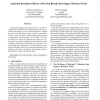Free Online Productivity Tools
i2Speak
i2Symbol
i2OCR
iTex2Img
iWeb2Print
iWeb2Shot
i2Type
iPdf2Split
iPdf2Merge
i2Bopomofo
i2Arabic
i2Style
i2Image
i2PDF
iLatex2Rtf
Sci2ools
127
Voted
CIMCA
2008
IEEE
2008
IEEE
Analysing Boundary Objects to Develop Results that Support Business Goals
In this study of eight outsourcing projects, we seek to understand the mechanisms that companies put in place to coordinate knowledge work across their boundaries. We find that means through which projects improve coordination include: using a mediator, using multiple passage points of information, and increasing work visibility. We offer a framework in which the following three facets are contemplated: knowledge coordination (who), boundary object translation (what) and coordination practices (how). Our results suggest the importance of securing effective translation of boundary objects (the concepts belonging to the business world and to the software development world) to align software results with business goals.
Boundary Objects | CIMCA 2008 | Internet Technology | Multiple Passage Points | Projects Improve Coordination |
Related Content
| Added | 29 May 2010 |
| Updated | 29 May 2010 |
| Type | Conference |
| Year | 2008 |
| Where | CIMCA |
| Authors | María Laura Ponisio, Peter Vruggink |
Comments (0)

